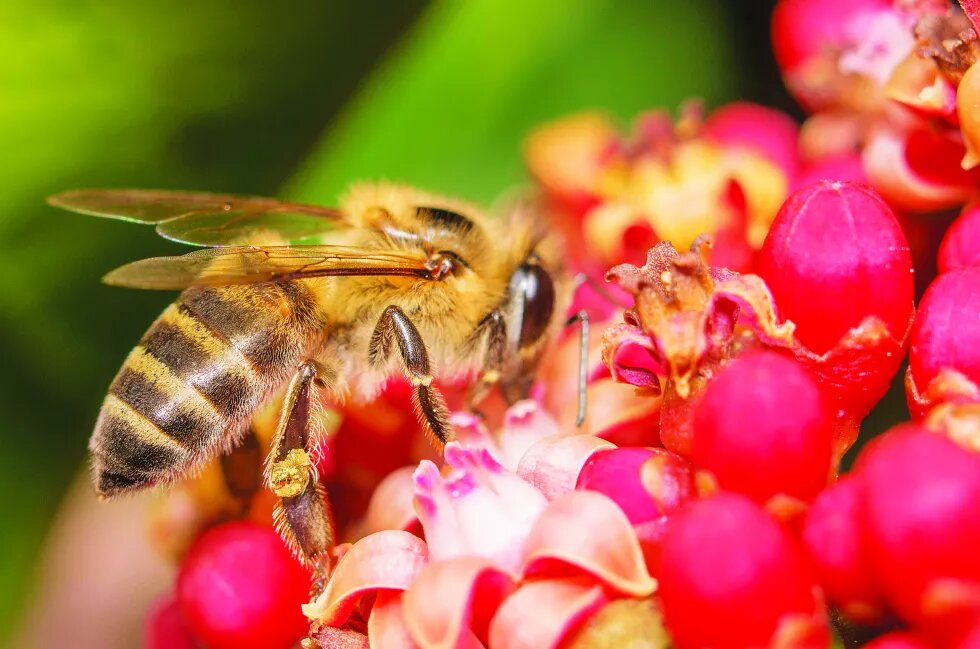Beneficial insects provide enormous ecosystem services to Africa. However, to continue benefitting from these natural processes, sustainable farming and environmental management practices need to be promoted.

Africa is among the most biodiverse regions in the world. It is home to more than 25 percent of the global biodiversity and has eight of the 25 biodiversity hotspots. Regions such as the Congo-basin, South Africa and Madagascar are considered megadiverse. Ecosystem services from this rich biodiversity have enormous potential to contribute to better livelihoods. There are nearly 7 million different insect species on the continent that provide pollination, pest control, decomposition, and maintenance of overall biodiversity.
Generally, insects are viewed as pests. However, only a small subset of insects are either pests of crops or carry human and livestock diseases in Africa. Pest populations are kept under check by natural factors, such as parasitoids, predators, and microbes. For instance, a small native micro wasp, Cotesia icipe, can specifically target armyworms and parasitize over 120 invasive fall armyworm larvae and kill them. Other natural enemies like dragonflies, damsel flies, predatory bugs, maggots of hoverflies, or rove beetles aid to keep in check a wide variety of insect pests. However, unsustainable, and intensive farming practices such as misuse of pesticides, monocultures and land use changes can significantly disrupt this natural balance. In addition, invasion by pests which are not native to Africa and changing climates, results in catastrophic outbreaks of crop pests affecting food security, human, animal and environmental health.
Conservation of natural enemies through sustainable farming practices can offer effective management of insect pests with positive economic and health impacts. For instance, release and conservation of a small parasitic wasp, Anagyrus lopezi, resulted in effective control of invasive cassava mealybug, Phenacoccus manihoti, in over 27 sub-Saharan Africa countries with estimate benefits of over 9.4 billion US dollars. In East Africa, release and conservation of parasitoids, Diadegma semiclausum and Cotesia vestalis, resulted in successful management of Plutella xylostella, a pesticide resistant pest of crucifers with significant economic impacts. Similarly, invasive fruit flies, Bactrocera dorsalis, is biologically controlled with parasitoids, Fopius arisanus and Diachasmimorpha tryoni in Africa. To ensure that countries continue to benefit from these biological control efforts, sustainable and compatible farming practices need to be promoted and scaled.
Beneficial insects do not only protect crops from pests, but they also aid in pollination. Several crops grown in Africa, such as avocado, cucurbits, African nightshades, cocoa, spider plants among others depend on insect pollinators to improve crop yields and quality. Beyond crops, pollinators contribute to maintaining plant biodiversity in natural vegetations. When we think of insect pollinators, most of us are reminded of honeybees, Apis mellifera, a major pollinator in the ecosystem. However, there are over 2,600 other species of bees in Africa that contribute to pollination. Some of them, such as stingless bees, also offer diverse and unique honey and honey-related products, like bee wax, to improve income and livelihood of farmers. Other insects such as moths, wasps, flies, beetles and ants also contribute to pollination. Close interaction of pollinators to cultivated crops, makes them vulnerable to unsustainable crop management practices such as pesticide misuse.
Organic fertilizers are a key resource in sustainable agriculture, the availability of which is scarce in Africa. Several insects such as house flies, blow flies, soldier flies, dung beetles and flower chafer beetles, thrive on organic waste and recycle them to high value biofertilizer for improved soil health and crop yields. In addition, the insect biomass generated also presents a rich source of protein, fats, minerals, vitamins, well-balance amino acids and other essential elements, which can be used as high-quality ingredients in animal feeds to substitute or replace the expensive and scarce fish and soya bean meals. These insects are an excellent source of oil with their potential use as biodiesel, additives in soap and cosmetic production as well as immunity enhancers.
The emergence of starch rich crops and domesticated livestock and birds has eroded the cultural acceptance of insects as a food option globally. However, in Africa, insects continue to be a traditional food with over 500 insect species consumed. Termites, locusts, long-horned grasshoppers, ants, saturniid caterpillars, crickets, among others, contribute to much-needed proteins, fats and essential minerals. Currently these insects are accessed from the wild during seasonal outbreaks which is increasingly affected by climate change. Wild harvested insects risk contamination from microbes, heavy metals, and pesticides. Recent research efforts in Africa led by the International Centre of Insect Physiology and Ecology (icipe) are focussed on science-based mainstreaming of edible insects, through sustainable mass rearing for their year-round availability. The focus is also to improve the nutrient profiles of edible insects for health and nutrition.
The biosafety of edible insects harvested from the wild and those mass-reared has been led to the development of enabling policies on edible insects in Kenya, Uganda, Rwanda and Tanzania. The positive research outputs and favourable policy environment has attracted private sector investments and youth business development and employment in the edible insect sector in East Africa.
This article was published in the Pesticides Atlas Kenya Edition.